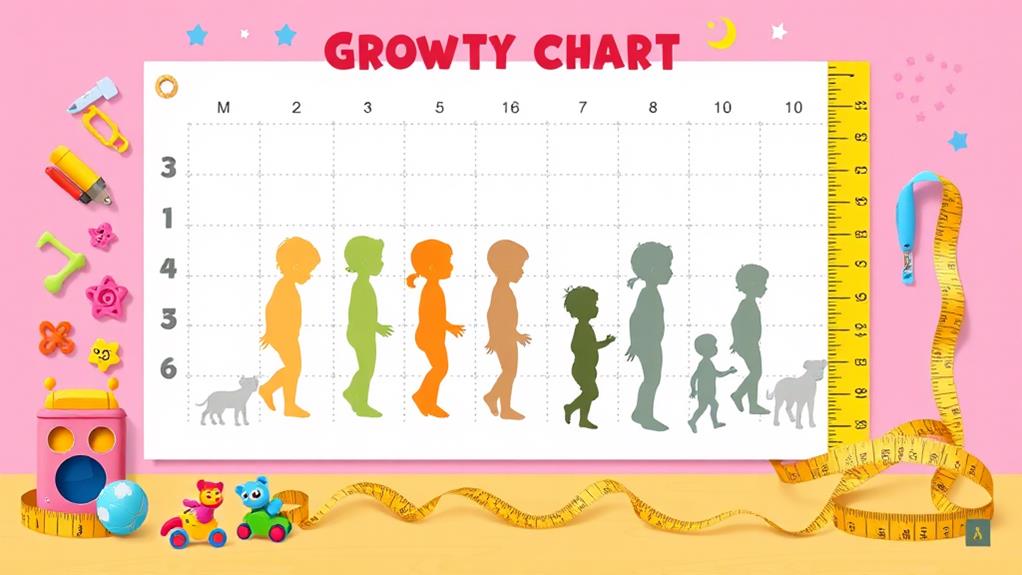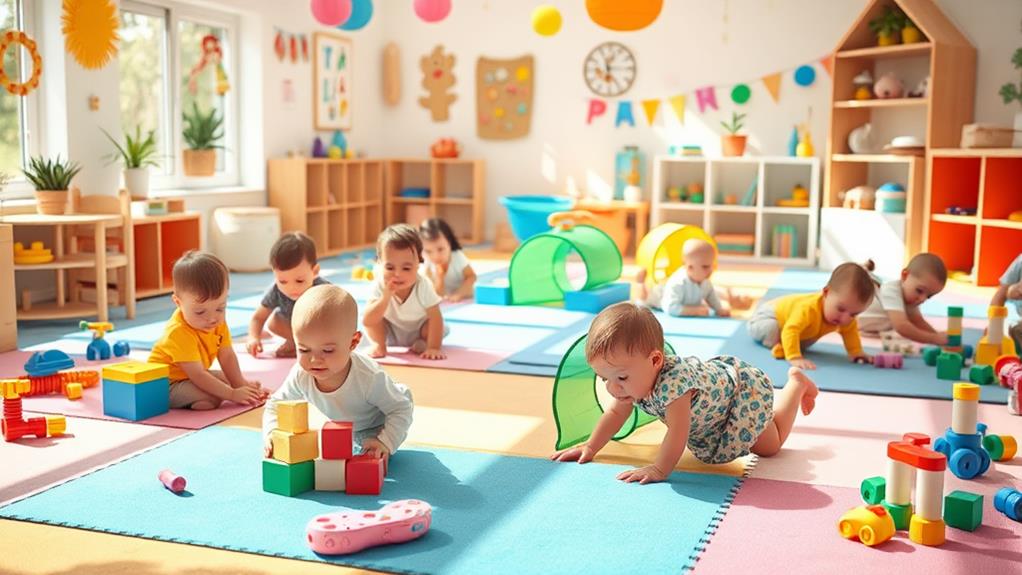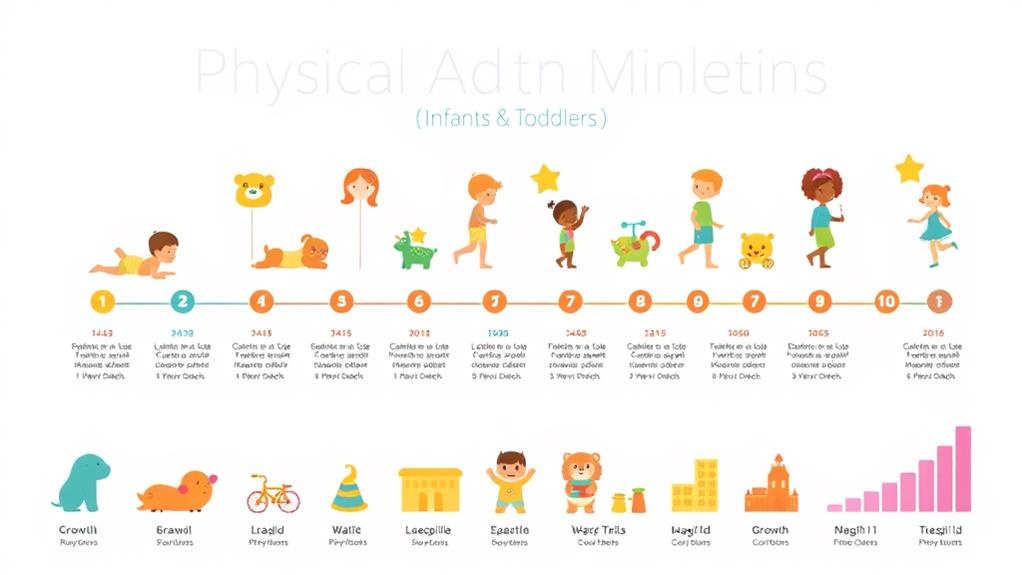When it comes to your child's physical development, understanding the key milestones can help you better support their growth. You might notice them lifting their heads at three months or taking their first steps by 18 months. By creating safe spaces for movement and selecting the right toys, you can encourage their motor skills effectively. However, there's much more to consider beyond these basic tips. What other strategies can you implement to maximize their physical potential?
Understanding Physical Milestones
As you observe your infant or toddler grow, understanding physical milestones can help you gauge their development. These milestones mark key points in your child's journey, revealing how they're progressing with their motor skills. Knowing what to expect can ease your concerns and keep you excited about their achievements.
For instance, around the age of 3 months, babies typically start to lift their heads while lying on their tummy. By 6 months, they may sit up with support, and by 9 months, they often begin crawling. These gradual changes are vital in developing strength and coordination.
As they approach their first birthday, you might notice them standing with assistance and possibly taking their first steps. By 18 months, many toddlers can walk independently. Understanding these milestones helps you celebrate each little victory, whether it's a first crawl or a first step.
Keep in mind that every child develops at their own pace. If you notice significant delays, it's always a good idea to consult a pediatrician.
Embracing these milestones enriches your experience as a parent and helps you support your child's growth effectively.
Key Developmental Stages
Recognizing the key developmental stages helps you understand your child's growth beyond just physical milestones. During the first year, your baby goes through rapid changes.
Initially, they'll focus on basic reflexes, like grasping your finger or turning their head towards sounds. By around three months, you'll notice more deliberate movements, such as reaching for toys. As they move closer to their first birthday, crawling becomes a big deal, setting the stage for walking.
When your child becomes a toddler, you'll see even more exciting developments. Between 12 to 18 months, they'll probably start walking unassisted, and this newfound mobility opens up a world of exploration.
You might find them climbing furniture or attempting to run. Social skills also start to blossom; your toddler will engage more with others, sharing toys or showing preferences for certain friends.
Growth Patterns in Infants

Tracking growth patterns in infants reveals important insights into their overall health and development. You'll notice that most babies experience rapid growth during their first year, typically gaining about 1.5 to 2 pounds each month and growing about an inch per month. By the time they reach six months, many infants double their birth weight!
It's essential to monitor not just weight, but also length and head circumference. These measurements help pediatricians evaluate if your baby is on track or if there are any concerns. Remember, each child grows at their own pace, so some variation is completely normal.
You might also observe growth spurts, which can make your baby hungrier and fussier than usual. These spurts often happen around two weeks, three months, and six months. During these times, it's important to respond to your baby's needs, as they require extra nourishment and comfort.
Regular check-ups ensure that your little one is developing properly and allow for early intervention if needed. Keeping track of these growth patterns not only gives you peace of mind but also helps you celebrate each milestone along the way!
Encouraging Motor Skills
Encouraging motor skills in infants and toddlers is crucial for their overall development. These skills help them explore their environment and build independence. To promote gross motor skills, you can create safe spaces for crawling and walking. Use soft mats, cushions, or blankets on the floor to encourage movement and exploration.
When they're learning to walk, support their efforts by holding their hands or offering sturdy furniture for them to pull up on.
Fine motor skills are just as important. You can enhance these skills by providing toys that require grasping, stacking, or manipulating. Simple items like blocks, soft balls, or even household objects like plastic cups can inspire creativity and coordination.
Additionally, consider engaging in activities that involve using their hands. Finger painting, playing with playdough, or tearing paper can sharpen their dexterity and hand-eye coordination.
Make it fun! Celebrate their achievements, no matter how small, and be there to cheer them on. Your encouragement helps build their confidence and motivates them to keep trying.
Importance of Play

Engaging in play is essential for the healthy development of infants and toddlers, as it serves as a natural way for them to learn about their world. Through play, children explore their surroundings, which helps them develop important motor skills. They learn to crawl, walk, and even run as they chase after toys or interact with their peers.
Play also encourages cognitive development. When toddlers stack blocks or sort colorful shapes, they're not just having fun; they're enhancing their problem-solving abilities and critical thinking skills.
Socially, playtime provides opportunities for children to bond with others, improving their communication and cooperation skills.
Additionally, emotional growth occurs during play. When kids engage in imaginative role-play, they learn to express their feelings, understand others' emotions, and build empathy. These experiences shape their ability to navigate relationships in the future.
In short, play is more than just entertainment; it's a crucial part of your child's growth. By encouraging play, you're not only helping them develop physically but also supporting their cognitive, social, and emotional development.
Practical Tips for Parents
As a parent, you play a crucial role in your child's physical development, and there are practical steps you can take to support this journey.
First, create an environment that encourages movement. Clear spaces for crawling, rolling, and walking help your little one explore. Use soft mats or blankets to cushion falls, as they'll happen!
Next, incorporate playtime into your daily routine. Engage in activities that promote gross and fine motor skills, like stacking blocks or playing with balls. These fun interactions not only enhance physical abilities but also strengthen your bond.
Encourage outdoor play whenever possible. Fresh air and open spaces provide opportunities for running, jumping, and climbing, which are essential for developing strength and coordination.
Don't forget about nutrition! A balanced diet rich in fruits, vegetables, and whole grains fuels your child's energy levels and supports overall growth.
Lastly, be patient and celebrate milestones, big or small. Every step your child takes toward independence is a victory worth acknowledging.




